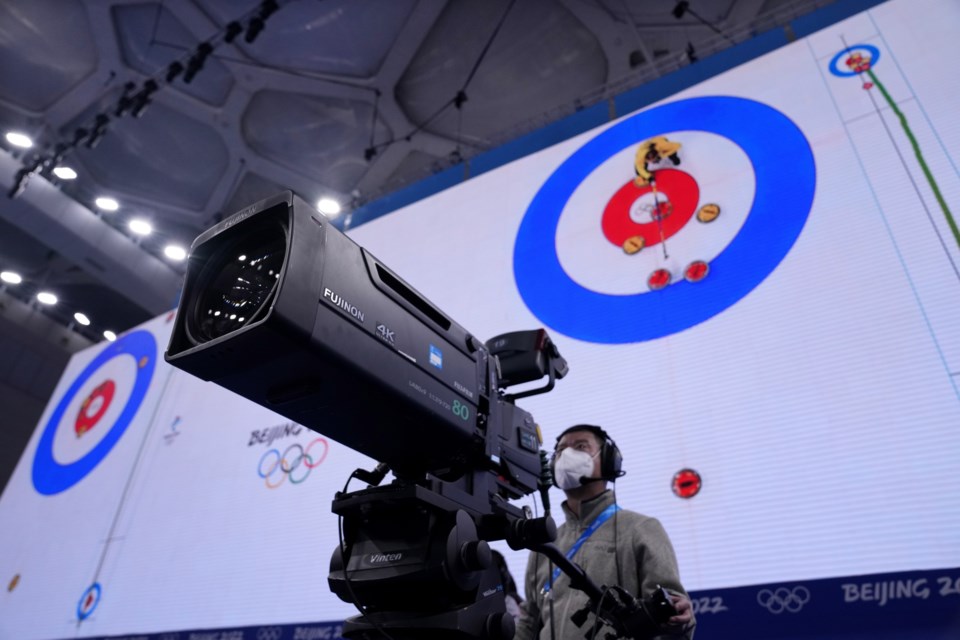BRAMPTON, Ont. — The Olympics used to be something that happened every four years. Just six months after the delayed Summer Games from Tokyo, however, some viewers may not be ready to let the Games begin again.
These 2022 Winter Games in Beijing face more hurdles than just Olympic burnout. For one thing, with new streaming platforms available in the last few years, there is a lot more competition for eyeballs. Broadcast TV just isn't the viewer magnet it once was.Â
Canada's host broadcaster CBC has tried to cast a wider net. It has extended coverage to include events on specialty channels TSN and Sportsnet, as well as CBC Gem and other digital destinations.
Like Tokyo, however, there is also a 13-hour time difference to contend with, putting live broadcasts of several events into early morning hours in North America. COVID-19 precautions also continue to dampen live events, with these Games largely closed to in-person spectators and families.
Another factor: politics. Especially evident in NBC's coverage are rising concerns over China's human rights record. Early in the opening ceremonies, prime time host Mike Tirico introduced two commentators focused on putting rising superpower China in broader context. "The world is a chillier place now," said Jing Tsu, a Yale University professor specializing in Asian studies, "and it's not just the weather."
As for the audience so far, according to data provided by Nielsen in the United States, NBC's coverage of Friday's opening ceremonies hit a historic low. Viewership was down 43 per cent from the Pyeongchang Games in 2018. NBC took their early morning live broadcast, combined it with Friday's prime time repeat, added in the number of people watching online and on their streaming platform Peacock and came up with 16 million Americans. Of that, 8.7 million tuned into NBC's prime time rebroadcast of the event.
CBC said its ratings data for the first weekend of Winter Games coverage would not be available until late Monday afternoon.Â
Still, it usually only takes a few medals for Canadians to get into the Olympic spirit and winning four in two days may have done that. As CBC reporter Colleen Jones — in Beijing along with Adrienne Arsenault — mused Friday, many are feeling "a need to celebrate something right now."
Those who are watching are seeing perhaps the finest high-definition Olympic coverage ever. Especially impressive so far is the camerawork during the freestyle mogul skiing events, with speeding athletes captured in perfect, 5G focus as they performLincoln loops (a sideways flip) and iron crosses.
Some of the innovations seem a bit gimmicky. CBC Olympic hosts Scott Russell in prime time, Andi Petrillo in the mornings, and Andrew Chang and Perdita Felicien on the daytime shift are all covering the Games from a studio in Toronto. CBC has been beaming up athletes in Beijing using "virtual guest" visual effects technology, to queasy effect for the home viewer.
Some effects, however, are welcome game-changers. The best is the freeze-frame figure skating replay where the sequences of a quad jump or a throw in pairs are played out in a trajectory and turned into a mural of athletic artistry.
Not being on the ground in Beijing limits opportunities to tell behind-the-scenes stories. A nice solution is CBC's sponsored "Breakthrough" segments. One on freestyle skier Mark McMorris opened with an animated sequence that turned his signature into a line drawing of a mountain range. Another, featuring Valérie Grenier, explained in cartoon form why she switched from downhill to giant slalom.
Veteran sports writer Allen Abel contributed a short CBC video celebrating the Olympic spirit found in athletes we love who never had a chance of winning. It was fun to catch up with U.K. ski jumper Eddie (the Eagle) Edwards, for example, as well as a member of the Jamaican bobsled team.
Here are a few other gold-medal reasons to get into these Games — along with a few efforts that miss the podium:
• After Justine Dufour-Lapointe crashed out on her final run in the women's mogul finals, her shot at a medal was over. Still, she got up and finished the race. "Why?" asked reporter Alison Chiasson in this Game's emotional high point so far. "Over the bad days like this," said Dufour-Lapointe, "the only thing that is important is never give up."
• The gold medal for commentator quips goes to CBC's Mike Atkinson. On Sunday, during the women's mogul event, he described Japan's Anri Kawamura, "slicing and dicing like a late-night infomercial."
• Kudos also to CBC figure skating commentator Brenda Irving who points out the unusual and creative but never intrudes on moments of quiet tension and performance. Former Olympian Kurt Browning, who complimented Canadian skater Madeline Schizas Sunday night on her "jumping math" — for adding rotations skipped earlier — also continues to shine as a figure skating analyst. His observations always land.
• The gold medal in Olympic advertising goes to a spot showing a man trying to build an ice rink in ancient Rome. That's followed by centurions arriving carrying hockey sticks. Even a tablet gag scores.
— Bill Brioux is a freelance TV columnist based in Brampton, Ont.
This report by The Canadian Press was first published Feb. 7, 2022.
Bill Brioux, The Canadian Press

